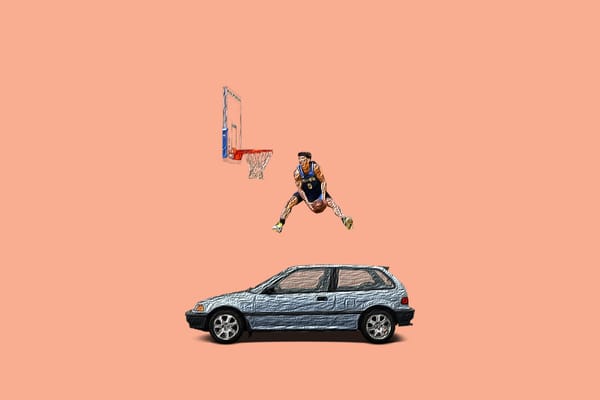Aging and trying
Plus: Jumping the shark, Shane Farber, The Fundamentals of Skateboard Judging and more.
The definitive weekly ranking and analysis of all the skateboarding and other online things that I cannot stop consuming and how they make me feel, personally.

Fonzie shit
Rank: 1
Mood: 😎
That’s also an apt way to describe Andy Anderson’s skating in general: the absurd done with comical ease. Whether it’s a coconut wheelie hill bomb, every try flip-to-grabs under the Olympic lights or grinding steep serpentining handrails; Anderson executes all with the cool confidence of a greased up, leather-jacket clad Henry Winkler.
Whatever your feelings on his style and approach—badass, punchline or somewhere in between—it’s clear that Anderson will be sticking around for a while, and skateboarding is better for it. Because we can let things get a little dry sometimes, our fuddy-duddy-ness draining skateboarding of its life, so if someone comes along with that magic touch, hell, why not let them bang on the thing and see what happens.


Aging and trying
Rank: 50+
Mood: 👵 🧓 👴

Skateboarding, being the relatively young pastime it is, has yet to really discover the upper bound limits of how hard one can skate as one continues the long, merciless climb into old age. Last week, skateboarding’s icon in yellow, Andy Mac, was seen front blunting a massive concrete extension in the land of notoriously big things, Houston, Texas. He is 48 years old.
Tony Hawk is still out here sacrificing his metacarpals to the deep end of backyard swimming pools into his 50s. The generation of skateboarders I idolized as a kid are now all deep into their 40s or older—Reynolds, Steamer, Rowley, Barbee, etc.—because that’s how time works. We know this. However, it is fascinating that they all are still so great at what they do. Yes, the drops they take have gotten smaller and the rails shorter, but they still test themselves.
Looking outside of the realm of professionals, last month, John Dahlquist, Vice Principal of Bryggeriets Gymnasium in Malmö, Sweden, released a video part commemorating his 45 years of existence—30 or so of them spent on a skateboard. In it, Dahlquist pushes himself, lands big and eats shit in the process—it’s fantastic and inspiring to those who wish to do the same, pro or not.
So while we still aren’t exactly sure when the party ends, if there’s an expiry date on this collaboration of board and body (for Hawk, it seems to be happening a trick at a time), the outlook is good. Our relationship, like any other, will change over time. Boundaries get set, habits adjust, and lots of stretching becomes necessary before getting physical.

The young man is very good
Rank: 2
Mood: 😦 😧 😮 😲
Faces made while watching the Shane Farber for Cons part.

The Fundamentals of Skateboard Judging Pt. 1: Nobody likes private criteria
Rank: 4.3
Mood: 🥇 🥈 🥉
Skateboarding’s benevolent competitive global overlords, World Skate, have released a 79 part, 5 episode long e-learning course that breaks down the “The Fundamentals of Skateboard Judging.” Curious as to how one goes about placing the amorphous, oozing action of skateboarding into a standardized rubric, I decided to sign up for the program (it’s free). On the registration page for the “World Skate Academy,” I was asked to provide my gender, age, and for reasons unclear, my Instagram handle.

After divulging your personal data, you are free to peruse the available lessons—only the first 11 parts (or episode one) have been released so far. The lessons with the more tantalizing titles like “Judging Criteria and Pizza Theory,” “Why are there no Firmly Assigned Points or Scores in Skateboarding,” “New Era, Influencing the Sport, Desired Character and Age of Judges,” and “Judging Skaters with Protective Gear” will be live in the coming weeks. In the meantime, I skimmed through “Judging Database.” I learned that World Skate has established, as the lesson title suggests, a database that will track the performance of anyone judging an international event. According to our instructor, World Skate’s Martin Karas, this will “provide a transparent foundation of facts based on the previous working results for any future nominations of skateboard judging partners, so nobody can accuse [World Skate, other event holders] of nominating judges based on subjective or private criteria that are not based on the performance or quality of the judges.” That does seem like an important step to take. It sounds like we’ve got a straight-shooting, non-controversial governing body on our hands.
So, will this course inspire the next generation of skateboard judgers? Can it remedy what seems at times to be an inconsistent system of awarding scores or perpetuate it? Will the database stop “private criteria” from tainting our hallowed competitive grounds? Time will tell.
Until then, stay tuned: next week we’ll dive crust deep into Pizza Theory.

Good thing, surprising thing
Rank: 1.1
Mood: 🎶
Bryce Wettstein is pro! That is good. They shred and seem like a lovely person.
Stereo skateboards still exist! And John Lupfer is (back?) on the team! That is surprising. But also good? Happy for everyone involved.

Something to consider: This kickass photo.
Good things: “More Joy and Less Cool” - Jose Vadi in The Yale Review.
Until next week… Try stretching before bed.






